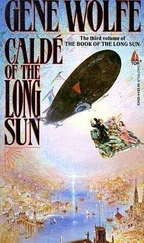Wolfe, Gene - The Best of Gene Wolfe
Здесь есть возможность читать онлайн «Wolfe, Gene - The Best of Gene Wolfe» весь текст электронной книги совершенно бесплатно (целиком полную версию без сокращений). В некоторых случаях можно слушать аудио, скачать через торрент в формате fb2 и присутствует краткое содержание. Жанр: Старинная литература, на английском языке. Описание произведения, (предисловие) а так же отзывы посетителей доступны на портале библиотеки ЛибКат.
- Название:The Best of Gene Wolfe
- Автор:
- Жанр:
- Год:неизвестен
- ISBN:нет данных
- Рейтинг книги:5 / 5. Голосов: 1
-
Избранное:Добавить в избранное
- Отзывы:
-
Ваша оценка:
- 100
- 1
- 2
- 3
- 4
- 5
The Best of Gene Wolfe: краткое содержание, описание и аннотация
Предлагаем к чтению аннотацию, описание, краткое содержание или предисловие (зависит от того, что написал сам автор книги «The Best of Gene Wolfe»). Если вы не нашли необходимую информацию о книге — напишите в комментариях, мы постараемся отыскать её.
The Best of Gene Wolfe — читать онлайн бесплатно полную книгу (весь текст) целиком
Ниже представлен текст книги, разбитый по страницам. Система сохранения места последней прочитанной страницы, позволяет с удобством читать онлайн бесплатно книгу «The Best of Gene Wolfe», без необходимости каждый раз заново искать на чём Вы остановились. Поставьте закладку, и сможете в любой момент перейти на страницу, на которой закончили чтение.
Интервал:
Закладка:
While we were on the level stone pavement of the roof garden she did not, as nearly as I could see, walk at all, but rather seemed to glide across the surface like an onyx chessman on a polished board; and that, in spite of all that has happened since, is the way I still remember her: as the black queen, a chess queen neither sinister nor beneficent, and black only as distinguished from some white queen I was never fated to encounter.
When we reached the stairs, however, this smooth gliding became a fluid bobbing that brought two inches or more of the hem of her black skirt into contact with each step, as if her torso were descending each as a small boat might a rapids—now rushing, now pausing, now almost backing in the crosscurrents.
She steadied herself on these steps by holding on to me and grasping the arm of a maid who had been waiting for us at the stair head and assisted her from the other side. I had supposed, while we were crossing the roof garden, that her gliding motion had been the result, merely, of a marvelously controlled walk and good posture, but I now understood her to be in some way handicapped, and I had the impression that without the help the maid and I gave her she might have fallen headfirst.
Once we had reached the bottom of the steps her smooth progress was resumed. She dismissed the maid with a nod and led me down the corridor in the direction opposite to that in which our dormitory and classroom lay until we reached a stairwell far toward the back of the house, a corkscrew, seldom-used flight, very steep, with only a low iron banister between the steps and a six-story drop into the cellars. Here she released me and told me crisply to go down. I went down several steps, then turned to see if she was having any difficulty.
She was not, but neither was she using the stairs. With her long skirt hanging as straight as a curtain she was floating suspended, watching me, in the center of the stairwell. I was so startled I stopped, which made her jerk her head angrily, then began to run. As I fled around and around the spiral she revolved with me, turning toward me always a face extraordinarily like my father’s, one hand always on the railing. When we had descended to the second floor she swooped down and caught me as easily as a cat takes charge of an errant kitten, and led me through rooms and passages where I had never been permitted to go until I was as confused as I might have been in a strange building. At last we stopped before a door in no way different from any other. She opened it with an old-fashioned brass key with an edge like a saw and motioned for me to go in.
The room was brightly lit, and I was able to see clearly what I had only sensed on the roof and in the corridors: that the hem of her skirt hung two inches above the floor no matter how she moved, and that there was nothing between the hem and the floor at all. She waved me to a little footstool covered with needlepoint and said, “Sit down,” and when I had done so glided across to a wing-backed rocker and sat facing me. After a moment she asked, “What’s your name?” and when I told her she cocked an eyebrow at me and started the chair in motion by pushing gently with her fingers at a floor lamp that stood beside it. After a long time she said, “And what does he call you?”
“He?” I was stupid, I suppose, with lack of sleep.
She pursed her lips. “My brother.”
I relaxed a little. “Oh,” I said, “you’re my aunt then. I thought you looked like my father. He calls me Number Five.”
For a moment she continued to stare, the corners of her mouth drawing down as my father’s often did. Then she said, “That number’s either far too low or too high. Living, there are he and I, and I suppose he’s counting the simulator. Have you a sister, Number Five?”
Mr. Million had been having us read David Copperfield , and when she said this she reminded me so strikingly and unexpectedly of Aunt Betsey Trotwood that I shouted with laughter.
“There’s nothing absurd about it. Your father had a sister—why shouldn’t you? You have none?”
“No, ma’am, but I have a brother. His name is David.”
“Call me Aunt Jeannine. Does David look like you, Number Five?”
I shook my head. “His hair is curly and blond instead of like mine. Maybe he looks a little like me, but not a lot.”
“I suppose,” my aunt said under her breath, “he used one of my girls.”
“Ma’am?”
“Do you know who David’s mother was, Number Five?”
“We’re brothers, so I guess she would be the same as mine, but Mr. Million says she went away a long time ago.”
“Not the same as yours,” my aunt said. “No. I could show you a picture of your own. Would you like to see it?” She rang a bell, and a maid came curtsying from some room beyond the one in which we sat; my aunt whispered to her and she went out again. When my aunt turned back to me she asked, “And what do you do all day, Number Five, besides run up to the roof when you shouldn’t? Are you taught?”
I told her about my experiments (I was stimulating unfertilized frogs’ eggs to asexual development and then doubling the chromosomes by a chemical treatment so that a further asexual generation could be produced) and the dissections Mr. Million was by then encouraging me to do and, while I talked, happened to drop some remark about how interesting it would be to perform a biopsy on one of the aborigines of Sainte Anne if any were still in existence, since the first explorers’ descriptions differed so widely and some pioneers there had claimed the abos could change their shapes.
“Ah,” my aunt said, “you know about them. Let me test you, Number Five. What is Veil’s Hypothesis?”
We had learned that several years before, so I said, “Veil’s Hypothesis supposes the abos to have possessed the ability to mimic mankind perfectly. Veil thought that when the ships came from Earth the abos killed everyone and took their places and the ships, so they’re not dead at all; we are.”
“You mean the Earth people are,” my aunt said. “The human beings.”
“Ma’am?”
“If Veil was correct, then you and I are abos from Sainte Anne, at least in origin, which I suppose is what you meant. Do you think he was right?”
“I don’t think it makes any difference. He said the imitation would have to be perfect, and if it is, they’re the same as we were anyway.” I thought I was being clever, but my aunt smiled, rocking more vigorously. It was very warm in the close, bright little room.
“Number Five, you’re too young for semantics, and I’m afraid you’ve been led astray by that word perfectly . Dr. Veil, I’m certain, meant to use it loosely rather than as precisely as you seem to think. The imitation could hardly have been exact, since human beings don’t possess that talent and to imitate them perfectly the abos would have to lose it.”
“Couldn’t they?”
“My dear child, abilities of every sort must evolve. And when they do they must be utilized or they atrophy. If the abos had been able to mimic so well as to lose the power to do so, that would have been the end of them, and no doubt it would have come long before the first ships reached them. Of course there’s not the slightest evidence they could do anything of the sort. They simply died off before they could be thoroughly studied, and Veil, who wants a dramatic explanation for the cruelty and irrationality he sees around him, has hung fifty pounds of theory on nothing.”
This last remark, especially as my aunt seemed so friendly, appeared to me to offer an ideal opportunity for a question about her remarkable means of locomotion, but as I was about to frame it we were interrupted, almost simultaneously, from two directions. The maid returned carrying a large book bound in tooled leather, and she had no sooner handed it to my aunt than there was a tap at the door. My aunt said absently, “Get that,” and since the remark might as easily have been addressed to me as to the maid I satisfied my curiosity in another form by racing her to answer the knock.
Читать дальшеИнтервал:
Закладка:
Похожие книги на «The Best of Gene Wolfe»
Представляем Вашему вниманию похожие книги на «The Best of Gene Wolfe» списком для выбора. Мы отобрали схожую по названию и смыслу литературу в надежде предоставить читателям больше вариантов отыскать новые, интересные, ещё непрочитанные произведения.
Обсуждение, отзывы о книге «The Best of Gene Wolfe» и просто собственные мнения читателей. Оставьте ваши комментарии, напишите, что Вы думаете о произведении, его смысле или главных героях. Укажите что конкретно понравилось, а что нет, и почему Вы так считаете.









